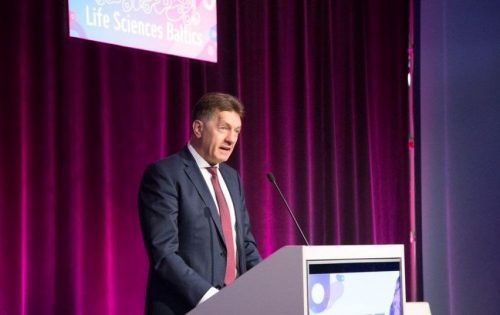Vilnius has become an impressive place for decision makers in the field of life sciences. This is what the Prime Minister of Lithuania Algirdas Butkevičius said at the opening of the Life Sciences Baltics conference that took place in September in Vilnius, Lithuania, among other things with active Israeli participation.

Vilnius has become an impressive place for decision makers in the field of life sciences. This is what the Prime Minister of Lithuania Algirdas Butkevičius said at the opening of the Life Sciences Baltics conference that took place in September in Vilnius, Lithuania, among other things with active Israeli participation.
According to Botkevičius, in 2012 an ambitious initiative was born to gather the experts, leading professionals and stakeholders to explore the potential of the Baltic States in the field of life sciences. And in the end it succeeded, the forum continues to lean on its core values and principles, focusing on the most important social issues, building partnerships, while taking advantage of knowledge transfer, business opportunities and market penetration.
"Lithuania is proud of its developed life sciences industry with an annual growth of more than 20% and exports to more than 70 countries. The recent large-scale public investment in live science research and development infrastructure has made Lithuania an attractive country to work with, the prime minister said.
The Prime Minister stated that Lithuania aims to be the leading father in Europe in health technologies and biotechnology in 2020. To support this, the Lithuanian government has invested 400 million euros in infrastructure in the field. Five science and technology valleys were established in order to provide favorable conditions and interaction between research, researchers and businesses.
According to the Prime Minister, the biotechnology, pharmaceutical and medical device industries contribute a particularly large part to GDP. In two decades, Lita became one of the most developed countries in the field in Central and Eastern Europe. Our biopharma and med-tech products have made their way to the most heavily regulated markets in the world.
Lithuanian Economy Minister Evaldas Gustas said that Lithuania has the same number of employees per million inhabitants in the field of biotechnology and life sciences as in developed countries such as the UK, USA and Germany - about 800 employees per million inhabitants, and eight drugs in development for every million people.
In Lithuania, there is cooperation between the government and the private sector, and the government helps to attract talents, drive R&D and business to biotechnology companies. The country also has a developed IT sector and it can be harnessed in the field of bioinformatics and in particular the analysis of visual medical information. In response to a question from the Hidaan site, the minister said that he visited Israel twice and learned from it how to develop technologies from the R&D stage.
Also Prof. Edmonds Salena, from the Center for Life Sciences at the University of Kovna, which, like the one at Boylan, unites three institutions that previously operated separately. And that as an implementation company of the university they work closely with the researchers and research groups to know at early stages what they are researching and to match them with relevant business companies. At the press conference, Salena said: "Of course we cannot succeed without an ecosystem, all ecosystem partners in Lithuania are strong: startup communities, mentors, expert networks, we work with other countries such as Israel, Ireland, Germany and more and try to share the success stories.
The industry side was represented at the press conference by Ramis Westers, CEO of Vitmed, a company that started with technology developed at the University of Kovna, but whose funding came from the US. The company develops and makes non-invasive systems for diagnosing problems after accidents and trauma without making a hole in the skull.
Commercialization in the life sciences is like a horse race - you have horses, a track, a rider and of course you need funding.
The race is on turning the technology into a product. Hospitals don't buy technology but products. I managed to raise 10 million in Series A, from Med-Tech in Boston, the company's first investment in Eastern Europe. It's also a race to commercialize: there has to be an important medical problem to solve, a big one or something that hasn't been solved in a small market but that will make a difference for patients and medical service providers.
The life sciences equivalent of investing in a jockey is the team. To commercialize technology you need the best team in the world, not in Lithuania or in the region. The story of success is people. As for the investors, the company started here but incorporated and raised capital in the US. Suggests looking for investments outside Lithuania. According to him, Israel is a good example - many Israelis come to Boston to look for investments, but the R&D remains in Israel.

One response
Science is not statements.